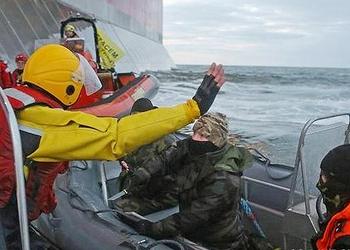
AMSTERDAM, The Netherlands, October 24 2013 (ENS) – Russia will not accept an international arbitration process under the UN Convention on the Law of the Sea at which The Netherlands is seeking the release of the Dutch-flagged Greenpeace ship Arctic Sunrise and its crew.
The Russian Foreign Ministry says it will not attend the hearing at the International Tribunal for the Law of the Sea. At that hearing, The Netherlands will ask the tribunal to direct Russia to release the Arctic Sunrise and its crew and allow them to leave Russian territory.

“Activists of the Greenpeace actions in relation to the platform Prirazlomnaya on 18 September violated Russian law on the exclusive economic zone and the continental shelf. A criminal investigation into the incident [is ongoing],” the Russian Foreign Ministry said in a statement Wednesday.
Yet the Ministry did say that “Russia remains open to resolving the situation.”
The Netherlands claims that the arrest and detention of the Arctic Sunrise and its crew in September during a protest action off Russia’s northern coast took place in violation of the UN Convention on the Law of the Sea.
On September 18 Greenpeacers used ropes in an attempt to board the Prirazlomnaya in protest against oil drilling in the Barents Sea. Russian law enforcement authorities arrested two activists at the scene.
The next day the Arctic Sunrise was boarded by coastguard officials, brought to the port of Murmansk and detained.
Thirty members of crew and journalists, nationals of: Argentina, Australia, Brazil, Canada, Denmark, Finland, France, Italy, Morocco, the Netherlands, New Zealand, Poland, Russia, Sweden, Switzerland, Turkey, Ukraine, the United Kingdom and the United States, were arrested and detained in Murmansk.
The “Arctic 30” as Greenpeace has dubbed them, are being held in a Murmansk prison on charges first of piracy and now of hooliganism and have been refused bail.
Greenpeace says, “Thirty people are behind bars in Russia following a peaceful protest against oil drilling in the Arctic. They took action because they know it is wrong to exploit melting ice to drill for more of the oil that is warming our world. They were first charged with piracy, an absurd accusation. Now the Russian authorities say that accusation is being replaced with a charge of hooliganism – a charge that is just as absurd and carries up to seven years in jail.”
Vladimir Chuprov of Greenpeace Russia said, “We will contest the trumped up charge of hooliganism as strongly as we contested the piracy allegations. They are both fantasy charges that bear no relation to reality. The Arctic 30 protested peacefully against Gazprom’s dangerous oil drilling and should be free.”
The Russian Federation ratified the UN Convention on the Law of the Sea, UNCLOS, on March 12, 1997. The treaty provides for compulsory third-party settlement of disputes over the interpretation or application of the convention.

During an October 17 media briefing in Moscow, Alexander Lukashevich of the Russian Ministry of Foreign Affairs explained that when ratifying the Convention of 1982, the Russian Federation made a reservation about “non-acknowledgement of jurisdiction of international bodies in disputes related to the implementation of sovereign rights and jurisdiction.”
But Greenpeace International attorney Daniel Simons argues that reservation “is overboard and does not apply in this instance.”
“It seems the Russian authorities don’t welcome the prospect of the lawfulness of their actions being assessed by an independent tribunal,” said Simons.
“It’s positive to see that Russia remains open to settling this case,” he said. “That said, Russia cannot pick and choose which parts of the Convention on the Laws at Sea it will apply.”
Simons said, “If the Russian Federation believes the tribunal lacks jurisdiction, the normal and proper thing to do would be to raise this at the hearing.”
The International Tribunal for the Law of the Sea, ITLOS, is an independent judicial body located in Hamburg, Germany, established to resolve disputes about the interpretation and application of the United Nations Convention on the Law of the Sea.
The Dutch authorities initiated an arbitration case against Russia on October 4, and on October 21 called for ITLOS to indicate “provisional measures” pending the outcome of that arbitration.
If the tribunal rules in favor of the Netherlands, the 28 Greenpeace International activists, freelance photographer Denis Sinyakov and freelance videographer Kieron Bryan could go free while they await confirmation of a Russian court date.
Copyright Environment News Service (ENS) 2013. All rights reserved.
© 2013, Environment News Service. All rights reserved. Content may be quoted only with proper attribution and a direct link to the original article. Full reproduction is prohibited.
